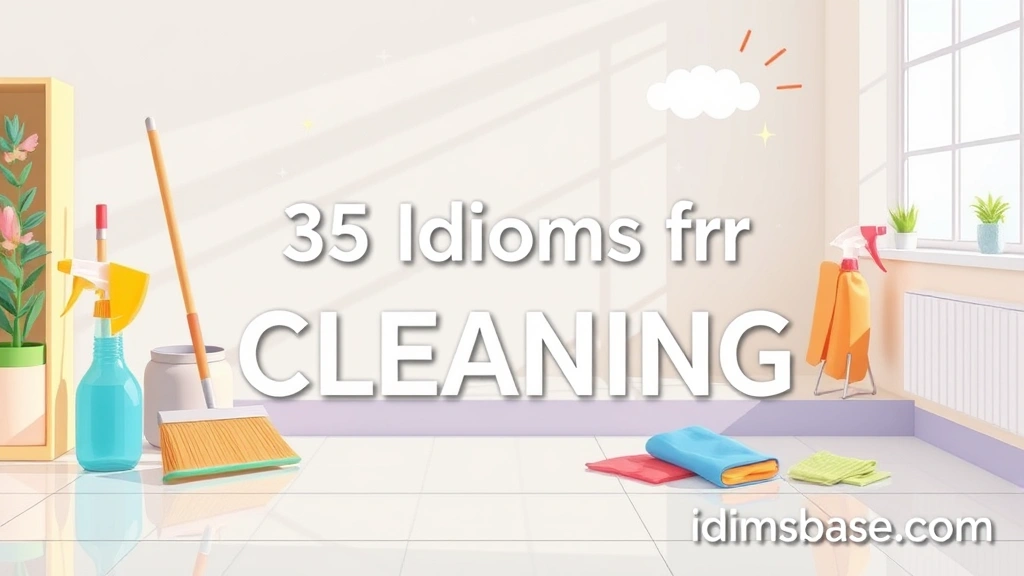Ever felt like your home needs a complete overhaul, a fresh start, or maybe just a little sparkle? Well, you're in good company! Cleaning isn't just about scrubbing and dusting; it's a universal experience, and as such, it’s woven itself into the very fabric of our language. Idioms, those quirky phrases that mean something different from their literal words, often give us a peek into shared human experiences. And guess what? Cleaning is a goldmine for them!
So, buckle up, because we’re about to embark on a fascinating journey through 35 idioms that revolve around tidying up, getting organized, and making things shine. You’ll be surprised how many of these you already use without even realizing their connection to cleaning! Let’s dive in and add some sparkle to your vocabulary!
35 Sparkling Idioms for Cleaning Up Your Language
Ready to sweep through some fantastic idioms? Here are 35 gems that will help you describe everything from getting organized to making a fresh start, all with a cleaning twist!
Idioms About Tidying and Organizing
These idioms help you talk about getting things neat and in order.
- Clean Up Your Act: This isn't about literally scrubbing the floor! It means to improve your behavior or performance.
- Example: "If you want to keep your job, you really need to clean up your act."
- Clear the Air: When you "clear the air," you resolve a disagreement or misunderstanding, making the atmosphere feel lighter, just like after a good airing out!
- Example: "After their big fight, they finally sat down to clear the air."
- Dust Yourself Off: This idiom is all about resilience! It means to recover from a setback and continue with renewed determination.
- Example: "She lost the competition, but she'll dust herself off and try again next year."
- Get Your House in Order: This phrase means to organize your affairs, whether personal, financial, or professional.
- Example: "Before starting a new business, it's wise to get your financial house in order."
- Make a Clean Sweep: To "make a clean sweep" means to win overwhelmingly or to remove everything completely. Think of a broom sweeping everything away!
- Example: "The new manager made a clean sweep, replacing almost the entire team."
- Sweep Something Under the Rug: Oh, this one’s a classic! It means to hide a problem or an unpleasant truth instead of dealing with it.
- Example: "They tried to sweep the scandal under the rug, but the media found out."
- Wipe the Slate Clean: This powerful idiom means to forget past mistakes or offenses and start fresh. Imagine erasing a chalkboard!
- Example: "Let's wipe the slate clean and start our partnership anew."
- Clean Out Your Closets: Beyond literally cleaning your wardrobe, this can mean getting rid of old habits, ideas, or even people from your life.
- Example: "After the breakup, she decided it was time to clean out her emotional closets."
- Spick and Span: When something is "spick and span," it's impeccably clean and tidy.
- Example: "Her kitchen is always spick and span, you could eat off the floor!"
- Neat as a Pin: This describes something or someone who is extremely tidy and well-organized.
- Example: "Despite his busy schedule, his desk is always neat as a pin."
- Shipshape: This nautical term means perfectly organized and tidy, just like a well-maintained ship.
- Example: "Before the inspection, we need to make sure everything is shipshape."
- Straighten Up: While it can mean to literally stand up straight, it often means to tidy up a place or improve one's behavior.
- Example: "Please straighten up your room before your friends come over."
Idioms About Fresh Starts and Purity
These idioms use cleaning imagery to talk about new beginnings and integrity.

- A Clean Bill of Health: This means a declaration that someone or something is healthy or in good condition.
- Example: "After all the tests, the doctor gave him a clean bill of health."
- A Clean Conscience: This refers to feeling no guilt or regret about something you've done.
- Example: "She could sleep soundly with a clean conscience, knowing she did her best."
- Clean Hands: To have "clean hands" means to be innocent of wrongdoing or to be free from guilt.
- Example: "He proved he had clean hands in the corruption scandal."
- Come Clean: This means to confess the truth about something, especially something you've been hiding.
- Example: "It's best to come clean about what happened before they find out."
- Get Washed Up: This idiom means to lose one's skill or ability, especially in a sport or profession.
- Example: "After years of being a top athlete, he felt completely washed up."
- Squeaky Clean: This can describe something literally very clean, or someone who is morally upright and beyond reproach.
- Example: "The politician maintained a squeaky-clean image throughout his career."
- Wash Your Hands Of: To "wash your hands of" something means to disassociate yourself from it and take no further responsibility.
- Example: "After trying to help him for years, she finally washed her hands of the situation."
- Brand Spanking New: This emphasizes that something is completely new and has never been used.
- Example: "They just bought a brand spanking new car."
- As Clean as a Whistle: This idiom describes something that is extremely clean, or a person who is entirely innocent.
- Example: "The room was left as clean as a whistle after the party."
- Sparkling Clean: Used to describe something so clean it shines.
- Example: "The windows were sparkling clean after I washed them."
Idioms About Removing or Eliminating
These idioms focus on getting rid of things, whether literally or figuratively.
- Clear the Decks: This means to prepare for action or to remove obstacles to make way for something new.
- Example: "We need to clear the decks for the new project launch next week."
- Clean Out: To "clean out" can mean to empty something completely, often by removing unwanted items.
- Example: "I need to clean out my garage this weekend."
- Flush Out: This means to force someone or something out of hiding.
- Example: "The police tried to flush out the suspect from the abandoned building."
- Mop Up: To "mop up" means to finish off a task or situation, especially after the main work is done.
- Example: "The team is now just mopping up the last few details of the project."
- Rake Over the Coals: While not directly about cleaning, this idiom implies a harsh scrutiny or scolding, getting rid of bad elements.
- Example: "His boss really raked him over the coals for missing the deadline."
- Scrub Up: This typically means to wash thoroughly, especially before a medical procedure, but can also refer to getting ready for something important.
- Example: "The surgeon scrubbed up before entering the operating room."
- Sift Through: To "sift through" means to examine a large amount of information carefully to find something specific.
- Example: "We had to sift through hundreds of documents to find the crucial evidence."
- Sweep Away: This means to remove or get rid of something completely, often forcefully.
- Example: "The strong current swept away the debris."
- Trim the Fat: This idiom means to reduce unnecessary expenses or staff in order to improve efficiency.
- Example: "The company decided to trim the fat from its budget."
- Wipe Out: To "wipe out" means to destroy completely or to eliminate.
- Example: "The disease was completely wiped out through vaccination."
- Clean House: This means to remove undesirable people or things from an organization or group.
- Example: "The new CEO promised to clean house and get rid of corruption."
- Wash Away: To cause something to disappear or be removed by water or tears.
- Example: "The heavy rain washed away the dirt from the streets."
- Scourge: While often a noun meaning a cause of suffering, as a verb, "to scourge" can mean to punish severely or to rid of something undesirable.
- Example: "The new policy aimed to scourge corruption from the system."

Key Takeaways
You’ve just swept through a fantastic collection of idioms, and hopefully, you’re feeling a little "spick and span" in your understanding of them! Here are the main takeaways from our linguistic spring cleaning:
- Cleaning is a Universal Metaphor: Many idioms use cleaning imagery to describe abstract concepts like fresh starts, honesty, and getting organized.
- Beyond the Literal: Idioms rarely mean what their individual words suggest. You need to understand their figurative meaning.
- Enhance Your Communication: Using idioms can make your language more colorful, expressive, and engaging, helping you connect with others in a more nuanced way.
- Cultural Insight: Idioms often reflect cultural values and common experiences. The prevalence of cleaning idioms shows how important order and renewal are in our shared human experience.
- Practice Makes Perfect: The best way to master idioms is to use them! Try incorporating a few of these new phrases into your everyday conversations or writing.
Frequently Asked Questions

What are idioms, and why are they important?
Idioms are phrases or expressions whose meaning cannot be understood from the ordinary meaning of its individual words. For example, "kick the bucket" means to die, not to literally strike a bucket with your foot. They are important because they add richness and color to language, making communication more dynamic and expressive. Understanding idioms is crucial for truly grasping the nuances of a language and for sounding like a native speaker.
How can I learn and remember these cleaning idioms?
Learning idioms takes practice! Here are a few tips:
- Context is Key: Always try to learn idioms in the context of a sentence or story. This helps you understand their meaning and how they are used.
- Visualize: Many cleaning idioms have a clear visual component (like "sweeping under the rug"). Try to picture the literal action to help remember the figurative meaning.
- Use Them: The best way to remember idioms is to actively use them in your conversations and writing. Start with a few that resonate with you.
- Flashcards: Create flashcards with the idiom on one side and its meaning and an example sentence on the other.
- Group Them: As we did in this listicle, grouping idioms by theme can help you organize and recall them.
Are these cleaning idioms used in formal or informal settings?
Most of the cleaning idioms listed are informal to semi-formal. You'll hear them commonly in everyday conversations, in media, and sometimes in business or political discourse to add a relatable touch. For example, "clean up your act" or "clear the air" are widely used. However, highly formal academic papers or legal documents would generally avoid using such idiomatic expressions to maintain precision and avoid ambiguity. When in doubt, consider your audience and the setting.
Do other languages have similar cleaning idioms?
Absolutely! While the specific phrases will differ, the concept of using cleaning as a metaphor for order, purity, or fresh starts is quite common across many languages and cultures. For instance, many languages have equivalents for "wiping the slate clean" or "getting your house in order," reflecting universal human experiences of needing to organize, resolve issues, or begin anew. It’s fascinating to see how different languages express these shared ideas!
Can I use these idioms interchangeably?
No, not all cleaning idioms can be used interchangeably, as they each carry a distinct meaning and connotation. While they all relate to "cleaning" in some sense, the type of cleaning or the result of the cleaning differs. For example, "clean up your act" is about improving behavior, while "wipe the slate clean" is about forgetting past mistakes. Always choose the idiom that best fits the specific message you want to convey. Using the wrong idiom can lead to confusion or sound awkward!






